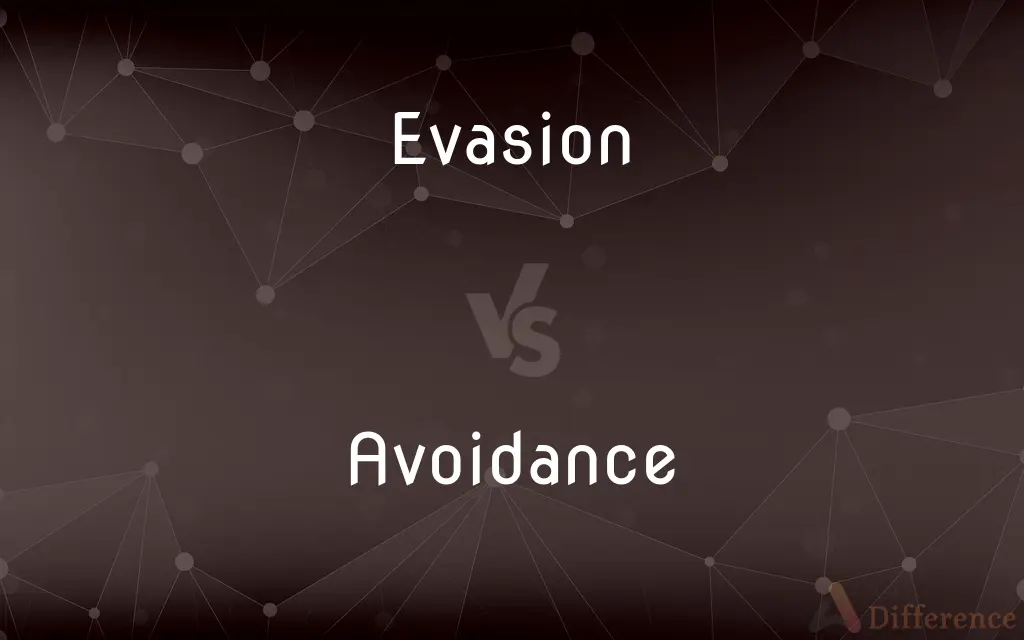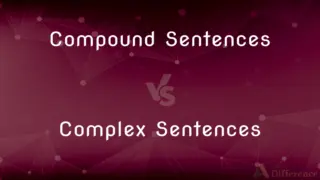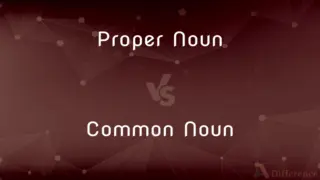Evasion vs. Avoidance — What's the Difference?
Edited by Tayyaba Rehman — By Fiza Rafique — Published on October 6, 2023
Evasion is the act of escaping or dodging something, often with deceit, while avoidance is the act of keeping away from or preventing a particular situation or condition.

Difference Between Evasion and Avoidance
Table of Contents
ADVERTISEMENT
Key Differences
Evasion and avoidance, while similar in intent—both involve distancing oneself from something—are nuanced in their application and context. Evasion carries a sense of subterfuge or deceit. It implies a more reactive response, often involving artful dodging or eluding, especially when faced with something unpleasant or threatening. Avoidance, however, has a proactive undertone; it pertains to a conscious decision to stay away from or not confront a particular situation, condition, or obligation.
In discussions of tax, for example, tax evasion refers to the illegal act of not paying taxes owed by deceitfully hiding income or information, while tax avoidance means using legal methods to reduce taxable income. The distinction is clear: one is unlawful and the other is legitimate, though potentially frowned upon. Similarly, in emotional contexts, evasion might mean not answering a direct question, weaving around it instead. Avoidance, in the same realm, would mean steering clear of situations that could lead to such questions.
Furthermore, evasion often infers a temporary or immediate relief from an immediate problem or situation, hinting at a possibility of future confrontation. Avoidance, on the other hand, is more about long-term strategy or habit, suggesting an ongoing effort to steer clear. To illustrate, evasion might be sidestepping a puddle on the road, while avoidance would be taking a different route altogether to not encounter any puddles.
Comparison Chart
Definition
Act of escaping or dodging, often with deceit
Act of keeping away from or preventing a situation
Connotation
Usually negative, implying deceit
Neutral or proactive, implying foresight
ADVERTISEMENT
Application
Reactive; immediate escape
Proactive; planned distancing
Duration
Temporary relief from an immediate situation
Long-term strategy or habit
Example Context
Evading direct questions or immediate threats
Avoiding situations that lead to confrontations
Compare with Definitions
Evasion
The act of escaping or dodging.
His evasion of the question was noticeable to all.
Avoidance
A conscious decision to not confront.
Her avoidance of the topic was clear.
Evasion
Eluding with guile or deceit.
She mastered the art of evasion during interrogations.
Avoidance
Prevention of a particular situation or outcome.
Sunscreen assists in the avoidance of sunburn.
Evasion
A tactic to avoid immediate confrontation.
The rabbit's evasion saved it from the fox.
Avoidance
A strategy to evade potential challenges.
He practiced avoidance by staying away from negative influences.
Evasion
An indirect response to a direct challenge.
The politician's evasion of the issue frustrated voters.
Avoidance
A method of circumventing potential problems.
Proper training can aid in the avoidance of workplace accidents.
Evasion
The act or an instance of evading.
Avoidance
The act of shunning or avoiding.
Evasion
A means of evading; a subterfuge.
Avoidance
(Law) An annulment.
Evasion
The act of eluding or evading or avoiding, particularly the pressure of an argument, accusation, charge, or interrogation; artful means of eluding.
Avoidance
The act of avoiding or shunning; keeping clear of.
Evasion
The act of eluding or avoiding, particularly the pressure of an argument, accusation, charge, or interrogation; artful means of eluding.
Thou . . . by evasions thy crime uncoverest more.
Avoidance
The act of annulling; annulment.
Evasion
A statement that is not literally false but that cleverly avoids an unpleasant truth
Avoidance
(obsolete) The act of becoming vacant, or the state of being vacant, specifically used for the state of a benefice becoming void by the death, deprivation, or resignation of the incumbent.
Evasion
The deliberate act of failing to pay money;
His evasion of all his creditors
He was indicted for nonpayment
Avoidance
(obsolete) The act of dismissing a person.
Evasion
Nonperformance of something distasteful (as by deceit or trickery) that you are supposed to do;
His evasion of his clear duty was reprehensible
That escape from the consequences is possible but unattractive
Avoidance
(obsolete) The act of quitting a position or benefice.
Evasion
The act of physically escaping from something (an opponent or a pursuer or an unpleasant situation) by some adroit maneuver
Avoidance
(obsolete) The course by which anything (especially water) is carried off.
Evasion
A temporary sidestep of an issue or situation.
His evasion of duties will catch up to him soon.
Avoidance
The act of annulling; annulment.
Avoidance
The act of becoming vacant, or the state of being vacant; - specifically used for the state of a benefice becoming void by the death, deprivation, or resignation of the incumbent.
Wolsey, . . . on every avoidance of St. Peter's chair, was sitting down therein, when suddenly some one or other clapped in before him.
Avoidance
A dismissing or a quitting; removal; withdrawal.
Avoidance
The act of avoiding or shunning; keeping clear of.
Avoidance
The courts by which anything is carried off.
Avoidances and drainings of water.
Avoidance
Deliberately avoiding; keeping away from or preventing from happening
Avoidance
The act of deliberately staying away from.
His avoidance of conflict made him a great mediator.
Common Curiosities
In taxes, what's the difference between evasion and avoidance?
Tax evasion is illegal non-payment, while tax avoidance is legally reducing taxable income.
What's the primary distinction between evasion and avoidance?
Evasion implies dodging with deceit, while avoidance suggests proactively staying away.
Can you evade responsibilities but avoid confrontations?
Yes, one can use evasion to dodge responsibilities and use avoidance to steer clear of confrontations.
Is evasion short-term while avoidance is long-term?
Generally, evasion is more immediate and temporary, while avoidance can be a longer-term strategy.
In psychology, how do evasion and avoidance play a role?
Both can be defense mechanisms, with evasion being more immediate and avoidance being a longer-term strategy.
Is evasion always negative?
Often yes, as evasion usually implies deceit, but context matters.
Is evasion always deliberate?
Evasion is usually intentional, though the motive behind it can vary.
Can evasion lead to larger problems?
Yes, evasion can sometimes delay issues, leading to bigger challenges later.
Can avoidance be seen as a coping mechanism?
Yes, avoidance can be a coping strategy, though not always a healthy one.
Do both evasion and avoidance imply fear?
Not necessarily. While both can stem from fear, they can also arise from strategy or preference.
Which is more proactive, evasion or avoidance?
Avoidance is generally more proactive, while evasion is more reactive.
Can avoidance be a positive strategy?
Yes, avoidance can be strategic, like avoiding harmful behaviors.
Are there positive forms of evasion?
While evasion often has a negative connotation, it can be seen positively in contexts like evading danger.
Is avoidance always about fear?
No, avoidance can be about preference, safety, strategy, or other reasons.
Can avoidance be unintentional?
Avoidance is typically a conscious choice, but subconscious avoidance can occur in psychological contexts.
Share Your Discovery

Previous Comparison
Compound Sentences vs. Complex Sentences
Next Comparison
Proper Noun vs. Common NounAuthor Spotlight
Written by
Fiza RafiqueFiza Rafique is a skilled content writer at AskDifference.com, where she meticulously refines and enhances written pieces. Drawing from her vast editorial expertise, Fiza ensures clarity, accuracy, and precision in every article. Passionate about language, she continually seeks to elevate the quality of content for readers worldwide.
Edited by
Tayyaba RehmanTayyaba Rehman is a distinguished writer, currently serving as a primary contributor to askdifference.com. As a researcher in semantics and etymology, Tayyaba's passion for the complexity of languages and their distinctions has found a perfect home on the platform. Tayyaba delves into the intricacies of language, distinguishing between commonly confused words and phrases, thereby providing clarity for readers worldwide.
















































